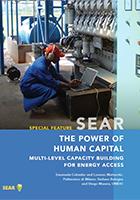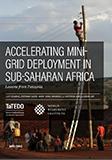Publications
Over the past decade, the debate on access to energy has tended to lean mostly on technology, finance, and policy as key drivers. Thanks to this approach, there has been some progress in expanding global energy access—although the goal of universal access is still far off and is likely to remain so for the next two decades. Scaling up the strategies for access to energy requires a different perspective and an innovative approach to capacity building. In line with the ethical imperative of the 2030 Agenda for Sustainable Development of “no one left behind” and its focus on people, the cross-cutting role of human capital (individually and collectively, as communities and institutions) becomes crucial both as a catalyst and a booster. Indeed, without the proper human resources, it will be impossible to achieve a transformative change in energy access—one that is efficient, effective, equitable, empowering, and long lasting. The innovative business models that form the basis of the new energy markets require that the various actors (including consumers, communities, policy makers, regulators, and financial institutions) understand their role and the key drivers. In strengthening the role of people throughout the entire energy supply chain—from production to users—capacity building and training activities become essential components of any successful project aimed at enhancing energy access. If properly designed, they develop the local expertise needed to replicate and scale-up successful initiatives, support ownership of stakeholders, and foster sustainability beyond the withdrawal of external partners.
This paper examines the power of human capital in expanding energy access and a possible multi-level framework. It begins with the concept of capacity building and its evolution, and then moves to how human capital contributes to energy access, highlighting objectives, principles,approaches, and lessons learned. The paper ends with a set of recommendations for access to energy—including a proposed systematic approach to interventions that would fully utilize the power of human capital.
Colombo, Emanuela; Mattarolo, Lorenzo; Politecnico di Milano; Bologna, Stefano; Masera, Diego. 2017. The Power of Human Capital Multi-Level Capacity Building for Energy Access. State of Electricity Access Report. Washington, D.C.: World Bank Group. http://documents.worldbank.org/curated/en/104731494940162971/The-power-of-human-capital-multi-level-capacity-building-for-energy-access


